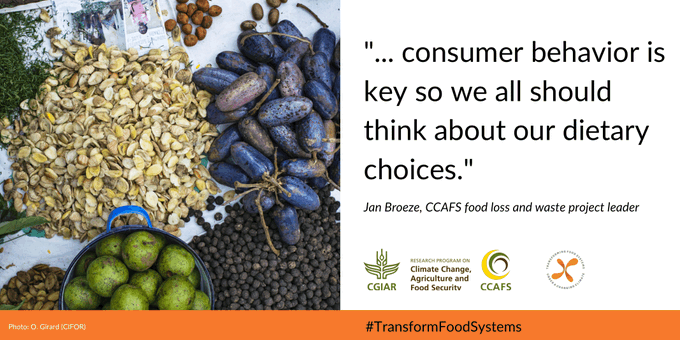Future technologies and food systems innovation
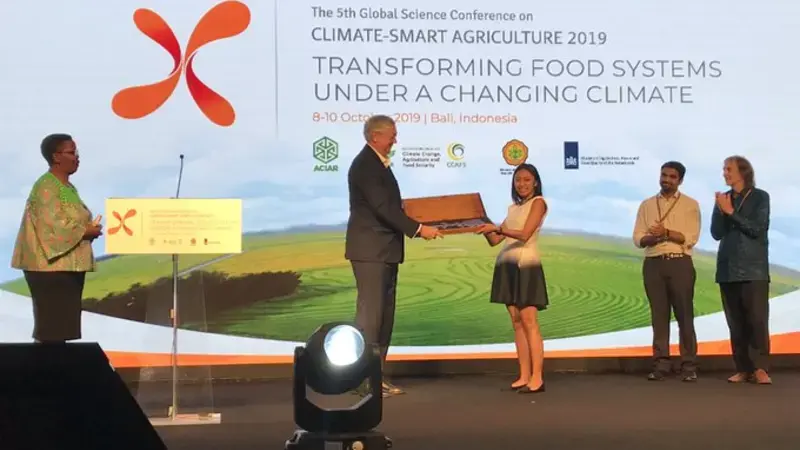
HE Hans Hoogeveen, Ambassador of the Netherlands to the FAO, announced the Netherlands will host the 6th Global Science Conference on Climate-Smart Agriculture in Spring 2021
Future technologies and food systems innovation for accelerating progress towards the SDGs: key messages (October 2019, 2 pages)
Mario Herrero Acostaa, Philip Thorntonb, Daniel Mason-D’Croza, Jeda Palmera
This briefing is part of Transforming Food Systems Under a Changing Climate, an initiative led by the CGIAR Research Program on Climate Change, Agriculture and Food Security (CCAFS) that aims to realize a transformation in food systems by mobilizing knowledge and catalyzing action. The initiative brings together leaders in science, business, farming, policy and grassroots organizations to identify pathways for transformation.
Related:
8 - 10 October 2019. Bali, Indonesia. The 5th Global Science Conference on Climate-Smart Agriculture 2019 - Transforming food systems under a changing climate.
Since the term climate-smart agriculture (CSA) was coined in 2010, the biannual global science conferences on CSA have emerged as the key global forum for scientific exchange to underpin CSA implementation. Building on the lessons from the previous conferences, the overarching theme of the 5th conference, ‘Transforming food systems under a changing climate’, takes cognizance of the need for transformation and aims to build the knowledge base needed to support the transformation required.
Objectives
- To mobilize the knowledge needed for food systems transformation under climate change.
- To catalyze the partnerships needed for transformation, bringing together all key stakeholders, from scientists, policy makers, investors and farmers.
- For the full program overview, click here.
Sub-theme 1: Empowering farmer and consumer organizations, women and youth
Collective actions by farmers and consumers are key to driving transformational change in food systems. At the same time, actions are needed to create conducive enabling environments that encourage producers, business owners, researchers, investors and policy makers to innovate in ways that promote gender equality and opportunities for youth. 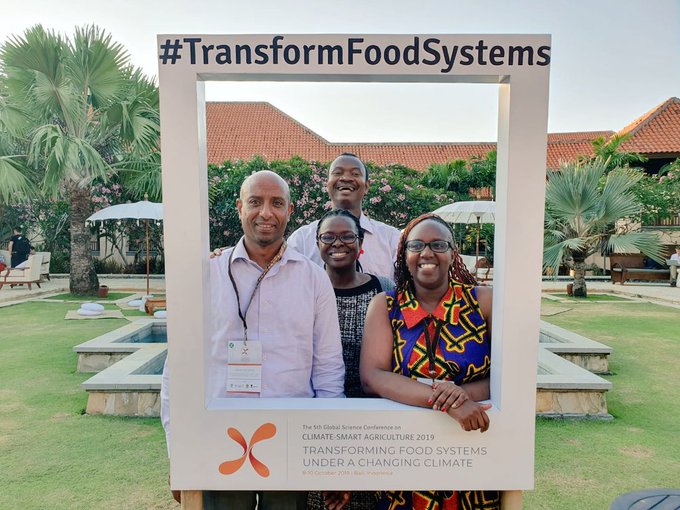

- Gender Transformation in Climate-Smart Agriculture: A Framework for Action – Sophia Huyer, Gender and Social Inclusion Leader, CCAFS-ILRI
- Accelerating Gender Equity in Agricultural Research for Development – Jayne Curnow, Research Program Manager, ACIAR
- Gender in Social Seed networks for climate change adaptation – John Recha, Participatory Action Research ILRI
- Role of women farmer-led institutions in scaling out Climate Smart Agriculture in smallholder farming systems – Nitya Chanana, Consultant, BISA-CIMMYT / CCAFS
- Innovative approaches to gender mainstreaming for accelerating adoption of climate smart agriculture in smallholder systems – Tripti Agarwal, Project Administrator, CIMMYT
Sub-theme 2: Digitally enabled climate-informed services
Agriculture is behind many sectors in the application of information and communication tools. This theme focuses on addressing this gap, and generating lessons for application of digital tools, disruptive technologies and big data, in extension, early response systems and adaptive safety nets.
- Scene setting – Anthony Whitbread, Research Program Director for Innovation Systems for the Drylands, ICRISAT
- Ram Dhulipala, Lead, Digital Agriculture Theme, ICRISAT
- Nurturing Africa’s Digital Revolution for Agriculture: agCelerant value chain orchestrators industrializing EO and IoT into smallholder agriculture – Pierre C. Sibiry Traore, Director, Research and Development at Manobi Africa and ICRISAT
- Social networks to practical use: Can strong social network actors help improve digital-delivery of climate-risk reducing services in Bangladesh? – Wolfram J. Simon, Master Student, Wageningen University and Research
- Contrasting approaches to developing digital tools for enabling climate adaptation – Julie Ingram, Reader in Sustainable Agri-Environmental Systems, University of Gloucestershire
Sub-theme 3: Climate-resilient and low-emission practices and technologies
New technologies and innovations are necessary to enhance resilience and facilitate adaption of low emissions development pathways.
- Wild futures: food-systems innovation for accelerating progress towards the SDGs, Philip Thornton/Mario Herrero IFPRI
- The Suitability of CSA Practices in Africa under Current and Future Climate Conditions, Christine Lamanna, Climate Change Scientist, ICRAF
- Solarising Irrigation in Indian Agriculture, Neha Durga, Research Consultant, IWMI
- Data science to support climate smart agriculture in South Asia: How can crucial data gaps be filled with big data stacks? Timothy J. Krupnik, Senior Scientist and Systems Agronomist, CIMMYT
- ITC’s Climate Smart Agriculture: Livelihood Improvement through Low Emission Technologies, Vijay Vardhan Vasireddy, Operations Manager, ITC Limited
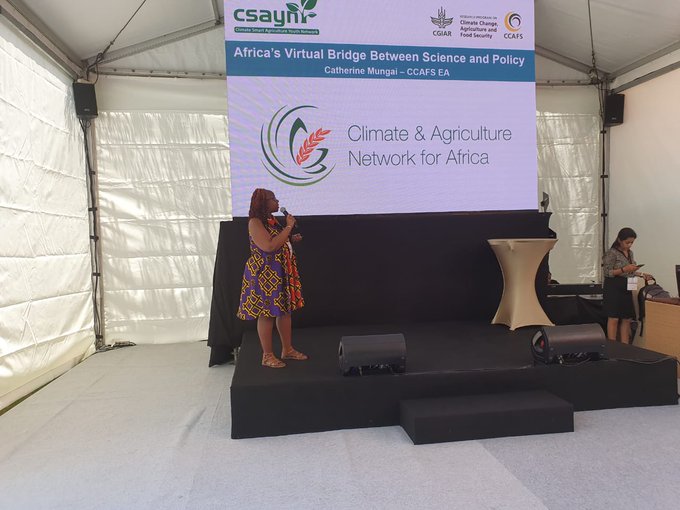 Sub-theme 4: Innovative finance to leverage public and private sector investments
Sub-theme 4: Innovative finance to leverage public and private sector investments
- Financing the Transformation of Food Systems Under a Changing Climate – Hans Loth, Global Head UN Environment Partnership, Rabobank
- Designing Prize Competitions to Spur Private Sector Action in Climate-Smart Agriculture: The Case from Vietnam, Tran Thu Ha, Team Leader of AgResults, SNV Netherlands Development Organisation
- Scalable interventions for climate smart cocoa and coffee sectors, Tiffany Talsma, Climate Strategy Specialist, International Center for Tropical Agriculture (CIAT)
- Ilaria Firmian, Regional Specialist- Asia Pacific, International Fund for Agricultural Development (IFAD)
- Tobias Baedeker, Agriculture Economist, World Bank
Sub-theme 5: Reshaping supply chains, food retail, marketing and procurement
Food system approaches are increasingly seen as key to identifying new opportunities for enhancing health, environment and enterprise. There is a need for system-wide actions to drive transformation, and focus on reshaping supply chains from farm to fork. These include new models of business-to-business coordination, new diets and consumer choices, and efforts to manage food loss and waste.
- One choice at a time: How supply chain decisions can transform the food system, Angela R. Hansen, Strategic Advisor, PhD Candidate, University of Cape Town
- Food Techs reshaping supply chains and consumer´s choice to reduce food waste, Daniele Eckert Matzembacher, Ph.D. Candidate, Universidade Federal do Rio Grande do Sul (UFRGS)
- Climate Change Mitigation and Food Loss and Waste Reduction: Exploring the Business Case, Duncan Gromko, Investment Expert, UNIQUE Forestry and Land Use
- Analysing trade-offs between food loss and waste reduction and GHG emissions, Jan Broeze, Scientist, Wageningen University and Research
- Integrating Climate-Smart Rice Agriculture in Supply Networks, Olivia Vent, Advisor, Lotus Foods
Sub-theme 6: Fostering enabling policies and institutions
Much attention has been focused on the need to make agriculture more climate smart, both for mitigation and adaptation. A stockpile of CSA technologies and practices also already exists. Much less discussion has focused on how to operationalize CSA. This theme brought together analytical and operational perspectives to identify and overcome some key challenges to the implementation of CSA.
- Mainstreaming Climate Smart Agriculture into a regional policy in a fast-track formulation process: lessons from the Centro American Region, JF Le Coq, CIAT/Cirad
- Combined use of numerical and conceptual models for climate-smart food systems – Marcelo Galdos, Met Office University, Academic Fellow in Modeling Food Security and Climate Impacts, University of Leeds
- Ease of doing adaptation and mitigation in agriculture: Can NDCs keep up to the promise? – Shalika Vyas, Project Scientist, CCAFS-BISA
Side events:
Fostering investment in climate-smart agriculture through innovative engagement in Sub-Saharan Africa
- The Challenge with Financing CSA Sithembile Mwamakamba, FANRPAN
- Using the Theatre for Policy Advocacy approach as a tool to showcase the challenges of scaling CSA?
- Using theatre for climate mitigation/adaptation – A farmers’ testimony by Natalia Kalipeni, Farmer from Malawi
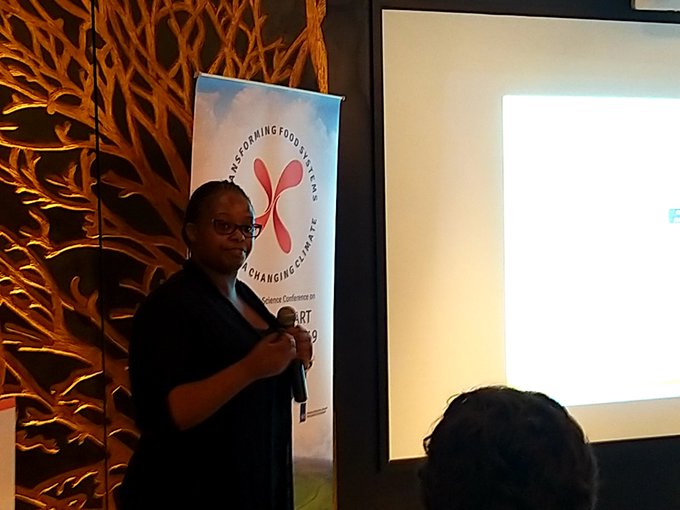 South-South collaboration: Key mechanism for buildingcapacity and scaling low-emissions technologies and practices
South-South collaboration: Key mechanism for buildingcapacity and scaling low-emissions technologies and practices
- Perennial grain crops in the rotation for enhancing soil carbon sequestration and sustaining crop production ; Sikiru Yusuf Alasinrin ; University of Ilorin, Nigeria/ PhD student at Federal University of Agriculture Abeokuta, Nigeria. Nigeria
- Business solutions for soil restoration ; Duncan Gromko ; KOFAR Kenya Limited. Kenya
- Increasing crop productivity and soil carbon storage on sandy soils: No soil left behind! Ngonidzashe Chirinda ; CIAT. Colombia
- Carbon Sequestering and Sustainability of Rice-Wheat Cropping System of South Asia by resource conservation technologies of Climate Smart Agriculture ; Adnan Zahid Institute of Agricultural Sciences, University of the Punjab, Lahore. Pakistan
- Improving Monitoring of Soil and Biomass Carbon Sequestration using Microwave Remote Sensing to enhance Climate Smart Agriculture ; Stella Ndirangu (see picture) ; Agriculture and Climate Risk Enterprise Ltd (ACRE Africa). Kenya


